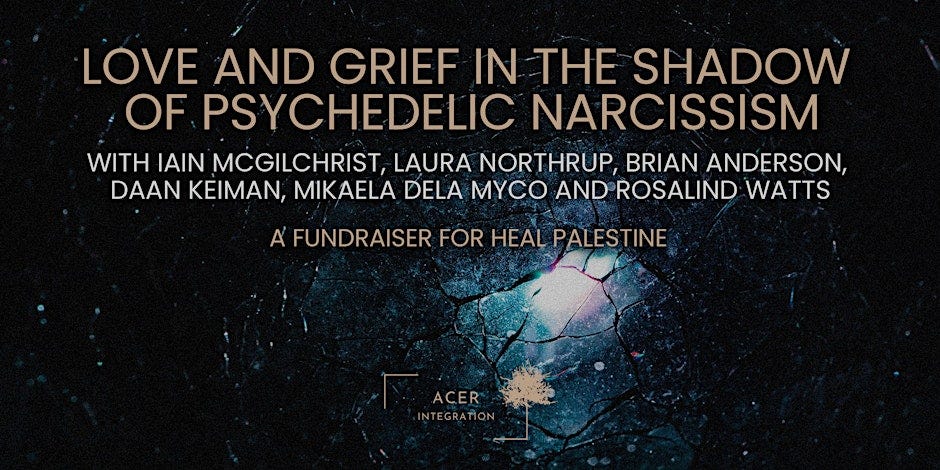If you liked reading this, feel free to click the ❤️ button on this post so more people can discover it on Substack 🙏
I write Toxic Workplace Survival Guy because toxic workplaces make me angry. I want to help as many people as possible do as I did: survive long enough to emerge with my mental health, dignity and career intact, on my own terms. A big thank-you to all those who’ve become paid subscribers.
Live Event: I’m delighted to share that I’ll be making my first live appearance as Toxic Workplace Survival Guy this month, at Love and Grief in the Shadow of Psychedelic Narcissism, an online event hosted by Dr Rosalind Watts’ Acer Integration community on Thursday, 23 May 19:00-21:30 BST. Tickets here.
Survival Tool#20: Connect with Your Tears
Eckhart Tolle writes: “You’re never upset for the reason you think.”
For a long time, this statement puzzled me.
Surely, I reasoned, we’re mostly all too aware of exactly what’s troubling us.
To assert otherwise seemed to defy common sense.
It took me years to understand thoroughly our reactions to challenging situations in the here-and-now are conditioned by our past.
A triggering incident — such as the kind of boundary violation that occurs routinely in our toxic workplace — will carry an intrinsic emotional charge.
But the reason such incidents are so difficult to brush off is that they resonate with the imprint of a trauma we’ve experienced — perhaps in our very early life.
Abandonment. Betrayal. Survival terror. Shame.
A lack of self-worth. A conviction that we’re unloveable. A fear that we’re the cause of the unhappiness in the adults around us. A belief we’d be better off dead.
Self-doubt. Rumination. Lack of confidence. Chronic stress. Anger and irritation.
Born as we are into fragmented cultures and family systems, most of us will be carrying a residue of some of this kind of heavy emotional-mental material that swirls around in childhood.
Mostly, these imprints lie dormant in our system.
But they can come back to life when an incident in our toxic workplace mirrors the dynamics of our original wound.
Before we realise it, our system is flooded with emotion, and we’re caught in negative thoughts loops that we can’t seem to break — no matter how irrational they may appear.
It’s important we don’t pathologise such reactions, which are normal in our toxic workplace. (Survival Tool #15: Befriend Your Defence Mechanisms).
But neither should we have to suffer in this way.
Fortunately, we don’t have to let our past rule our present.
The key is to stay present enough with our process in the moments that we’re triggered so that we can begin to trace our reaction to its root.
Excavating Our Layers
If we’re angry, then we’ll usually find fear underneath.
And underneath that fear, we’ll find grief.
And that’s when we can connect with our tears.
The moment when we really meet our deepest grief is the moment when things start to shift.
Obviously, our toxic workplace is not a good place for us to start crying.
Such work may be best undertaken with the support of an appropriate therapist or group. We can also work with a partner, friend or relative capable of making enough space for us to fully experience the feelings we mostly suppress.
As soon as it feels safe enough, our nervous system will begin to release the original traumatic imprint — and that often happens through tears.
We’ve been so deeply conditioned to think that crying is not okay that many of us suffer from what the American therapist Susan Stiffelman calls “dry-eyed syndrome” — we feel like we can’t cry.
So here are some options to consider for letting yourself go:
Slow Down — It’s very easy to stuff down our emotions through constant activity. We may need to carve out an hour to find a quiet place, perhaps put on some moving music, and allow the tears to come.
Trust Your Body — Remember that your body is intelligent: It knows how to rebalance, release and regulate. It’s often our self-critical minds that stand in the way of this process. If you can begin to trust your body more, your nervous system will begin to relax, and you’ll find yourself crying more easily.
Tears Don’t Last Forever — Some people fear that if they allow themselves to start crying, their tears will never stop. This is usually a sign that we’ve touched on some very early childhood experience — when it did seem that our big feelings would never end. As adults, we can remember that no feeling lasts forever, and that by stepping into our sadness and tears, we can find new perspectives on the other side.
Summary
Toxic workplaces are so painful because they touch into unintegrated trauma from our early life. When we feel safe enough to feel the old grief that our toxic workplace ordeal is touching in the present, we can surrender to the healing power of tears.
Recommended Reads
I recently discovered the excellent work of Nathalie Martinek on navigating narcissism at work. I highly recommend her substack Hacking Narcissism:
And here is an excellent description of a company’s decline into toxicity from Nausherwan Ghaffar:
And for more on the kind of inner work I write about above, please check out my sister publication Resonant World:
I consult on surviving toxic workplaces; and can also help you navigate your toxic workplace via the Tarot. Click here to inquire:
I write Toxic Workplace Survival Guy during my spare time from working as an editor at nonprofit climate news service DeSmog (a model workplace). Subscribing, sharing, liking, commenting or buying me a coffee helps make this project sustainable. Thank you!








